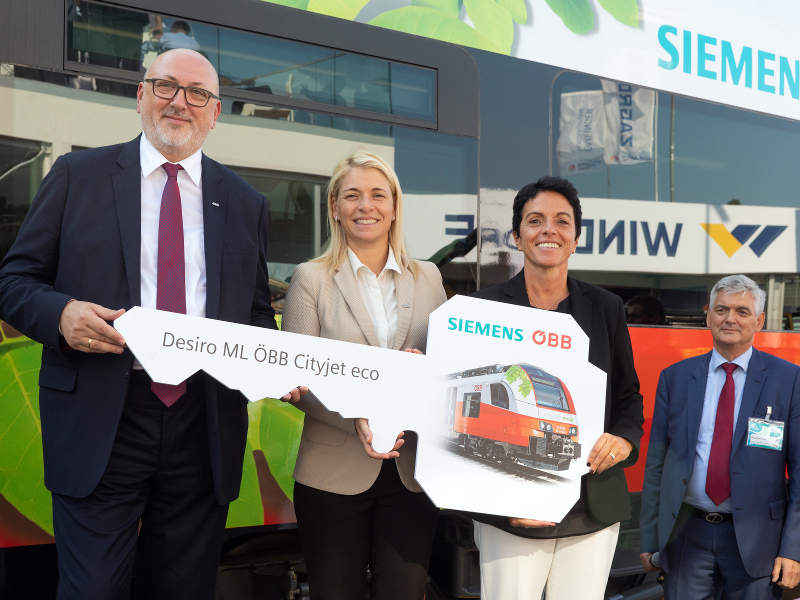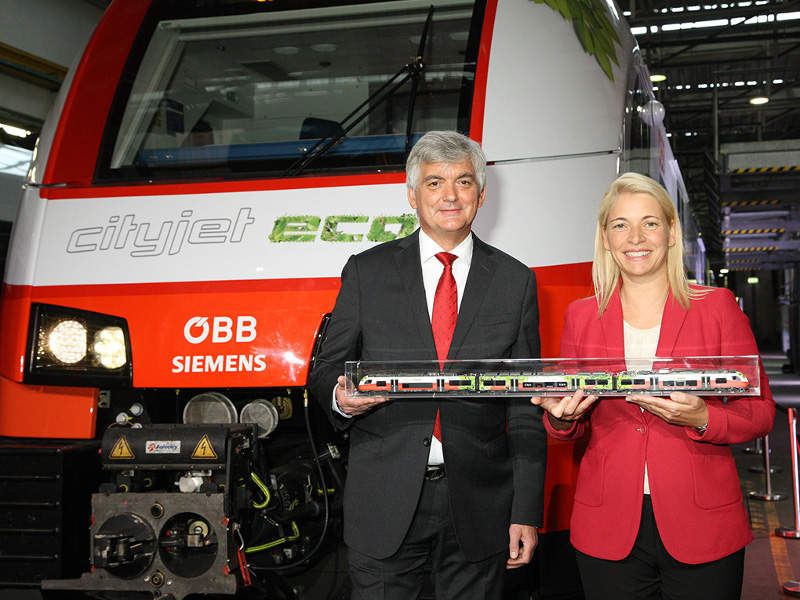Desiro ML Cityjet eco is a new battery-powered passenger train being developed by Siemens Mobility. Based on the Siemens Desiro platform, the train is specifically designed to operate on shorter routes.
The train has the ability to operate on non-electrified rail lines, and can be equipped with electro-hybrid battery drive for operations on electrified rail lines. It features a three-car design and is expected to highly reduce the operational and maintenance expenses.
A pilot project for the development of the battery-powered train was launched by Siemens and Austrian Federal Railways (ÖBB), as part of the ÖBB’s Update Fleet Strategy 2035 to achieve zero emission traction across its fleet by 2035.
The pilot project involves the conversion of a Siemens Desiro ML train into Cityjet eco through the installation of electro-hybrid battery drive.
The prototype of the eco-friendly train was unveiled at the InnoTrans 2018 international trade fair for transport technology held in Berlin, Germany, in September 2018.
The Desiro ML Cityjet eco is expected to enter service in the second half of 2019, upon completion of the testing phase.
Design and features of the battery-powered train
The overall length of the train when three rail cars are coupled, is 75.15m. Each car is fitted with two doors, which enable easy ingress and egress of passengers. It has a maximum seating capacity of 244 passengers.
The train comes with a maximum axle load of less than 17t, including the traction battery pack. Designed to operate on standard-gauge railways with a track gauge of 1,435mm, the train has a floor height of 600mm.
The train is built in compliance with the crashworthiness standards of Technical Specifications for Interoperability (TSI) and EN 15227. It also complies with the CEN/TS 45545 and DIN 5510 fire protection level 2 standards.
The CityJet eco train can operate on both electrified and non-electrified routes. It sources electricity from the overhead electric lines to charge the on-board batteries while running on electrified tracks. The energy stored in the batteries will be used to power the train on non-electrified routes.
Desiro ML Cityjet eco train interiors
The rail coaches are based on the SF 6000 family of rolling stock offered by Siemens. The passenger compartments of the Cityjet eco feature spacious interiors and integrate neutral colour schemes and folding tables.
The adjustable ergonomic seats in each compartment are custom-made to meet the passenger requirements. The cars also feature dedicated areas for transportation of bicycles and multi-functional spaces for conducting business meetings.
The sustainable features of the passenger compartment include large windows to allow natural light into the interiors, CO2-controlled air conditioning system, and a daylight-dependent LED lighting system.
Battery technology used in Desiro ML Cityjet eco
The Desiro ML Cityjet eco is equipped with lithium-titanate batteries based on linear tape-open (LTO) technology. The batteries have high charging retention capacity and can be charged in a shorter time compared to lithium-ion batteries.
The special thermal concept used for the battery containers avoids the impact of external weather conditions on battery life and charge status. The lifetime of the batteries is approximately 15 years.
The middle rail car of the train is equipped with DEIRO ML traction unit, which houses three battery packs, a battery cooling system, two DC/DC controllers and other support systems. The usage of battery packs reduces CO2 emissions by 50%.
Propulsion and performance
The train, when operating in AC mode, requires an electric power supply of 15kV AC or 25kV AC and traction power of 2,600kW. The installed battery capacity of the train is 528kW/h.
The Desiro ML Cityjet eco can travel at a maximum speed of 140km/h on electrified tracks and can attain a maximum speed of 120km/h when operating in battery mode. The starting accelerations of the train in AC mode and battery mode are 1m/s² and 0.77m/s² respectively.




